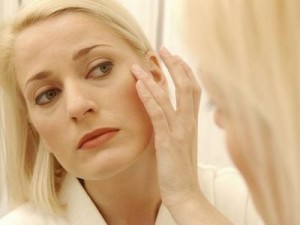 One of the most frequent complaints I hear from my older patients is that their skin is making them look older than they feel! It’s true that after age 40 we begin to decline in the amount of certain hormones we individually have and can start to lose skin elasticity and thickness. Fine lines, wrinkles, dark spots, and sagging can then start to appear.
One of the most frequent complaints I hear from my older patients is that their skin is making them look older than they feel! It’s true that after age 40 we begin to decline in the amount of certain hormones we individually have and can start to lose skin elasticity and thickness. Fine lines, wrinkles, dark spots, and sagging can then start to appear.
However, I also have other patients in their 60s and 70s who have clear, wrinkle and sag-free skin who look younger than their years. What’s the difference between patients? It all has to do with the amount of building blocks your skin has available to repair damage, maintain/restore density and elasticity. Let me explain why.
Why Does Skin Age?
Your skin is the largest organ of your body. It is a living, breathing entity. Like other organs, if you don’t maintain its health both inside and out, wear and tear, internal factors like decreasing hormones, as well as other external factors (see below) will cause skin to start breaking down. Damaged and poorly cared for skin will age more dramatically than well taken care of skin.
First let’s consider what external factors create skin-aging:
- Environmental: We all need adequate Vitamin D from sunlight, but baking for hours in the sun destroys skin elasticity, and puts you at high risk for serious skin issues like cancer. Other things like cigarette smoke, smog, pollutants, drugs, also take their toll.
- Inadequate nutrition: Lack of optimal skin building vitamins and antioxidants like beta carotene, Vitamin C, Vitamin E, hyaluronic acid doesn’t allow you to make collagen – the substance that knits your skin together and maintains its elasticity.
- Inadequate hydration: Dehydration can cause skin to sag and wrinkle as it does not have enough water in the tissues to maintain buoyancy. Drink enough water every day and adjust upward if you are exercising/sweating. Minimum eight, 8 oz glasses a day.
- Lack of sleep: Nothing has a quicker aging effect on your facial skin as inadequate sleep. It creates dark circles and bags under your eyes, as well as sagging jowls. Skin repairs itself during sleep, and 7-8 hours uninterrupted sleep is crucial.
- Stress: Like sleep, increasing stress levels can cause your skin to look as stressed and tired as you are. Although you can’t always prevent stressors in your life, you can compensate by trying to get more rest during these periods.
- Poor skin care: Repeatedly putting harsh chemicals on your skin can damage it. Most grocery store, detergent-like bar soaps that you may shower, or wash your face with, contain strong chemical agents that strip your natural oils. Instead, choose pure castile, glycerine, or olive oil based soaps to retain the natural, protective oils in your skin.
Now, let’s talk about the internal factors that cause your skin to age, namely the decrease of hormones, in particular, two important skin-youth hormones DHEA and melatonin. In addition to the male hormone testosterone and the female hormone estrogen decreasing starting around age 40, two other critical hormones also start to decrease.
DHEA, or dihydroepiandrosterone, is a kind of “master hormone” that can manufacture both estrogen and testosterone when needed. Estrogen builds collagen and hyaluronic acid which maintain skin elasticity and thickness. However, both estrogen and DHEA levels, in most people, decline sharply by age 45 and skin becomes thinner and can start lining, wrinkling and sagging.
Melatonin is another critical hormone that regulates sleep and also helps preserve a healthy, youthful skin appearance. It too decreases significantly after age 40 and both sleep and skin appearance can suffer as a result.
What Can I Do To Maintain Youthful Skin?
Preventing damage from external factors such as those listed above is a good foundation on which to maintain youthful skin. The next is replenishing important skin building blocks through supplemental skin creams to renew a youthful look. By delivering DHEA, melatonin and other skin-helper supplements directly into the skin, 85% is absorbed and used right in the skin. When you take these supplements orally, most of their benefit is destroyed by the liver. Here’s what DHEA and melatonin do for the skin:
- DHEA: Converted into estrogen and androgen metabolites in the skin which boosts collagen and hyaluronic acid. Protects blood vessels, and helps skin heal. Prevents external carcinogens from attaching to DNA and wards off damage from pollutants.
- Melatonin: Protects against UV ray damage. Research shows it protects against sunburn if applied topically before sun exposure. In low amounts, it stimulates cell production.
By now, I’m sure you’re wondering where can I find these skin anti-aging creams? As I tell my patients, there are numerous skin anti-aging products on the market. However, look for one that contains most of the following to get the most anti-aging skin benefits:
- DHEA, melatonin, even progesterone.
- Antioxidants vitamins C, E, resveratrol, even green tea.
- Skin booster substances like hyaluronic acid and collagen in varying mixtures.
Growing older doesn’t have to mean looking older. It’s a concerted effort between practicing good skin care, making use of beneficial skin creams, maintaining good nutrition, water intake, adequate rest, low alcohol, decreased stressors, fresh air and exercise. You too can be like those elderly patients of mine who have beautiful skin and defy aging by looking decades younger than their age!
Stay Well,
Jay Brachfeld, M.D.
Combating Elderly Skin http://www.athomecare.com/CombattingElderlySkinAging.aspx
Bio-Identical Hormones for the Skin,
DHEA, http://www.mayoclinic.com/health/dhea/NS_patient-dhea
Photo Credit: beautysaloon.wordpress.com
